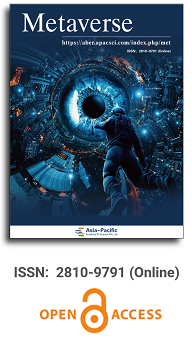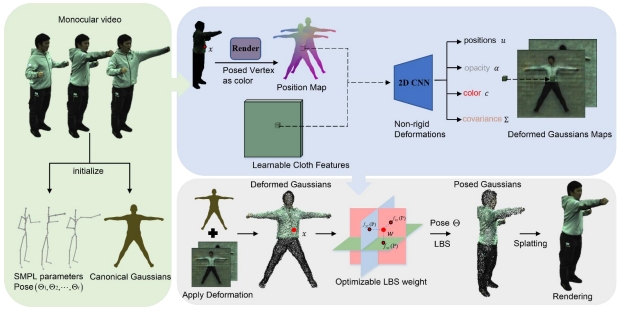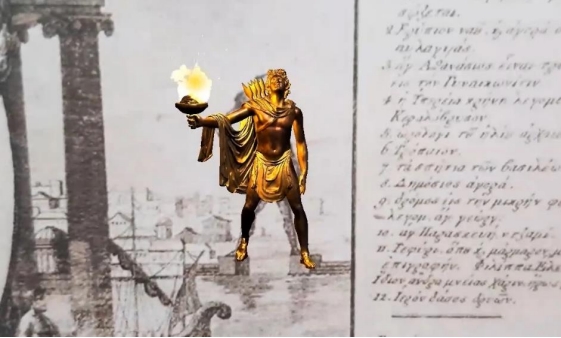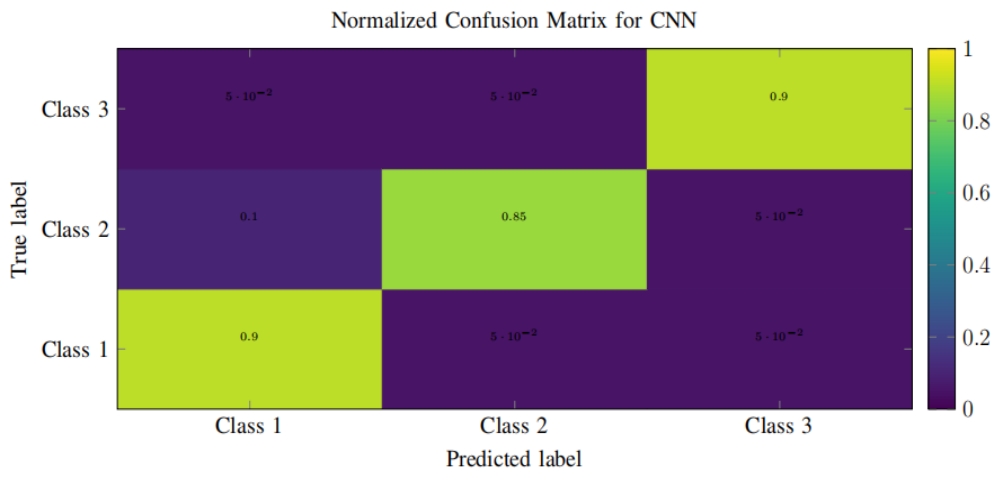
Asia Pacific Academy of Science Pte. Ltd. (APACSCI) specializes in international journal publishing. APACSCI adopts the open access publishing model and provides an important communication bridge for academic groups whose interest fields include engineering, technology, medicine, computer, mathematics, agriculture and forestry, and environment.



Metaverse as a cross complex scene of technical education
Vol 2, Issue 1, 2021
Download PDF
Abstract
In the digital age, major changes have taken place in the field of education. All those involved in the teaching stage are invited to reflect on the challenges involved in technical literacy. The purpose of this article is to consider the cross-complexity challenges involved in technical literacy as metaverse enters the classroom. With the support of humanistic paradigm, literature research adopts philological methods, qualitative methods, exploratory interpretation types, literature design, reading technology and search tools, organization and information analysis. After two years in prison, the educational process is still utopian in the face of a technological world full of differences, prototypes, contradictions and challenges. Before existing bases are subject to the wrong dogma that technology will replace them or become their biggest enemy, the education system must be strengthened to understand the changes of prototypes. Surprisingly, the pandemic has fostered a vision of a world where it is possible to assess, reassess and give new relevance to the training process. Therefore, it is necessary to balance the beliefs of epistemology, ontology, teleology, axiology and methodology, and produce a new dialogue in the interrelated educational practice. In this dialogue, transcendence is promoted and a higher level of knowledge is achieved under the internal reflection of people in digital education.
Keywords
References
- Balza A. Thinking about the postdoctoral research from a transcomplex perspective. Investigación y Postgrado 2009; 24(3): 45–66.
- Morin E, Ciurana E, Motta R. Educar en la era planetaria (Spanish) [Education in the planetary age]. Sinéctica, Revista Electrónica de Educación, 2004; (24): 74–76.
- Carrizo L. El investigador y la actitud transdisciplinaria. Condiciones, implicancia y limitaciones (Spanish) [Researchers and interdisciplinary attitudes conditions, meanings and limitations]. Montevideo: Latin American Centre for the Human Economy; 2000.
- Campechano-Covarrubias J. El pensamiento complejo y el pensar lo educativo (Spanish) [Complex thinking and educational thinking] [Internet]. 2005. Available from: http://www.Alisco.Goaf.Complexeducation.
- Mujica-Sequera R. El mundo del metaverso en la educación (Spanish) [The world of the metaverse in education] [Internet]. [Blog Docentes 2.0]. Available from: https://blog.docentes20.com/2022/01/%e2%9c%8del-mundo-del-metaverso-en-la-educacion-docentes-2-0/
- Pérez R. El Docente Universitario en el Escenario Transcomplejo de la Educación (Spanish) [University teachers are in the super complex stage of education]. Revista Diálogos del Postdoctorado 2015; 1(7): 173–177.
- Sotolongo P. Complejidad y Morfogénesis: De las Propiedades de los Sistemas a la Existencia misma de tales Sistemas (Spanish) [Complexity and morphogenesis: From the nature of the system to the existence of the system]. Havana: Instituto de Filosofía de La Habana; 2011.
- Dolch J. Ciencia del aprendizaje y de la enseñanza en general (Spanish) [Science of learning and teaching in general] [Internet]. 1952. Available from: https://recursoseducacionpregrado.wordpress.com/2010/09/03/la-didactica-y-suvalor-en-proceso-de-e-a/
- Azevedo F. Sociología de la educación: Introducción al estudio de los fenómenos pedagógicos y de sus relaciones con los demás fenómenos sociales (Spanish) [Sociology of education: Introduction to the study of pedagogical phenomena and their relationship with other social phenomena]. Moxico: Fondo de cultura Económica; 1942.
- Díaz-Barriga F. Aportaciones de las perspectivas constructivista y reflexiva en la formación docente (Spanish) [Contributions of the constructivist and reflective perspectives in teacher training]. Perfiles Educativos 2002; 24(97-98): 6–25.
- González J. Paradigma Educativo Transcomplejo Educación del siglo XXI (Spanish) [Transcomplex educational paradigm 21st century education]. Revista CON-ciencia 2014; 2(1): 9–14.
- Mujica-Sequera R. Herramientas para la Educación Digital (Spanish) [Tools for digital education] [Internet]. [Docentes 2.0] [Video]; 2021. Available from: https://youtu.be/P1vfuhtaBx4
- Jiménez R, Aguado T. Pedagogía de la diversidad (Spanish) [Pedagogy of diversity]. Madrid: UNED; 2002.
- Mujica-Sequera R. ¿Cuántos Tipos de Aprendizaje Existen? (Spanish) [How many types of learning are there?] [Internet]. [Docentes 2.0] [Video]; 2016 [updated 2016 Sept 11]. Available from: https://youtu.be/RQLhjFvnoFU
- Kranzberg M. Science-Technology-Society: It’s as Simple as XYZ! Theory into Practice; 1985.
- De Bono E. New think: The use of lateral thinking. Oxford: Publicaciones de la Universidad de Oxford; 1967.
- Balza A. Investigación Social y Desobediencia Paradigmática. Un desafío Transcomplejo para el Docente del Siglo XXI (Spanish) [Social research and para-digmatic disobedience: A transcomplex challenge for the 21st century do-cent]. Chisinau: Editorial Académica Española; 2015.
- Korr-Cetina K. Comunidades científicas o arenas transepistémicas de investigación? (Spanish) [Scientific communities or trans-systemic research arenas?]. Redes 1996; 7(3): 129–160.
- Cabero J. Las nuevas tecnologías de la información y comunicación: Aportaciones a la enseñanza (Spanish) [New information and co-communication technologies: Contributions to education]. Nuevas tecnologías aplicadas a la educación. New York: McGraw-Hill Interamericana de España; 2000.
- Burbules N. Aprendizaje Ubicuo. Entrevistado por IIPEE-Unesco (Spanish) [Ubiquitous Learning. Interviewed by IIPEE-Unesco] [Internet]. 2012. Available from: http://www.iipe-buenosaires.org.ar/node/645
- Mujica-Sequera R. Tecnoeducación como elemento fundamental en la sociedad actual (Spanish) [Techno-education as a fundamental element in today’s society] [Internet]. [Docentes 2.0] [Video]; 2020 [updated 2020 Dec 13]. Available from: https://youtu.be/or6WUXtwnus
- Zhang G, Lin M. A framework of social interaction support for ubiquitous learnin. 19th International Conference on Advanced Information Networking and Applications (AINA’05); 2005 Mar 28–30; Taipei. Taipei: Tamkang University; 2005.
- Flores A, García A. Reflexiones en torno al aprendizaje ubicuo en la enseñanza universitaria (Spanish) [Reflections on ubiquitous learning in university education]. Memorias del 9no Congreso Internacional de Educación Superior Universidad; 2014 Oct 31–Nov 2; Wuhan. Beijing: Chinese Society of Higher Education; 2014.
- Verneaux R. Epistemología General o Crítica del Conocimiento (Spanish) [General epistemology or critique of knowledge]. Gerdex; 1997.
- Lanz R. El arte de pensar sin paradigmas (Spanish) [The art of thinking without paradigms]. Educere 2005; 9(30): 421–425.
- Lomelli M. Investigación Transdisciplinaria. Un camino para trascender la cotidianidad del aula (Spanish) [Transdisciplinary research: A way to transcend the everyday life of the classroom]. Maracay: Universidad Pedagógica Experimental Libertador; 2007.
- Yarzabal L. Transdisciplinariedad y Prospectiva en la Transformación Universitaria (Spanish) [Trans disciplinarity and foresight in University Transformation]. Caracas, Venezuela: Segunda Jornada Dialógica; 2001.
- Balza A. Pensar la investigación y el aprendizaje desde la perspectiva de la transdisciplinariedad (Spanish) [Thinking about research and learning from the perspective of transdisciplinarity]. Venezuela: Universidad Bicentenaria de Aragua; 2005.
- Rodríguez T, Baños M. E-Learning en mundos virtuales 3D. Una experiencia educativa en Second Life (Spanish) [E-Learning in 3D virtual worlds: An educational experience in second life]. Revista Icono 2011; 14(2): 39–58.
- Villegas C. La investigación: Un enfoque Integrador transcomplejo (Spanish) [Research: A trans-complex integrative approach]. Aragua: Universidad Bicentenaria de Aragua; 2006.
- Gutiérrez F, Prado C. Ecopedagogía y ciudadanía planetaria (Spanish) [Ecopedagogy and planetary citizenship]. De La Salle: De La Salle Editores; 2015.
Supporting Agencies
Copyright (c) 2021 Ruth M. Mujica-Sequera

This work is licensed under a Creative Commons Attribution 4.0 International License.

This site is licensed under a Creative Commons Attribution 4.0 International License (CC BY 4.0).

Prof. Zhigeng Pan
Professor, Hangzhou International Innovation Institute (H3I), Beihang University, China

Prof. Jianrong Tan
Academician, Chinese Academy of Engineering, China
Conference Time
December 15-18, 2025
Conference Venue
Hong Kong Convention and Exhibition Center (HKCEC)
...
Metaverse Scientist Forum No.3 was successfully held on April 22, 2025, from 19:00 to 20:30 (Beijing Time)...
We received the Scopus notification on April 19th, confirming that the journal has been successfully indexed by Scopus...
We are pleased to announce that we have updated the requirements for manuscript figures in the submission guidelines. Manuscripts submitted after April 15, 2025 are required to strictly adhere to the change. These updates are aimed at ensuring the highest quality of visual content in our publications and enhancing the overall readability and impact of your research. For more details, please find it in sumissions...






.jpg)
.jpg)

